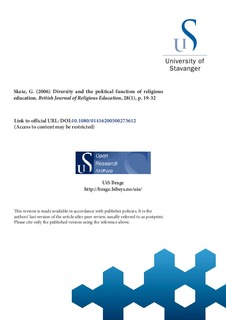| dc.contributor.author | Skeie, Geir | |
| dc.date.accessioned | 2014-03-31T12:49:33Z | |
| dc.date.available | 2014-03-31T12:49:33Z | |
| dc.date.issued | 2006-01 | |
| dc.identifier.citation | Skeie, G. (2006) Diversity and the political function of religious education.British Journal of Religious Education, 28(1), p. 19-32 | nb_NO |
| dc.identifier.uri | http://hdl.handle.net/11250/193336 | |
| dc.description.abstract | Questions about the relationship between religion and politics are discussed with particular focus
on the consequences for religious education. Norway is taken as an example of a country where
increasing cultural diversity challenges traditional politics of religion. In the present climate of
conflicting views on the role of religion in politics, religious education is higher on the political
agenda in many European countries, but it is unclear which path the governments choose to follow.
For religious educators it is important to engage critically in the political debate about religion, and
to show a basic political loyalty towards the education of the individual child and towards improving
the lifeworld of children. | nb_NO |
| dc.language.iso | eng | nb_NO |
| dc.publisher | Taylor & Francis | nb_NO |
| dc.subject | VDP::Samfunnsvitenskap: 200::Pedagogiske fag: 280 | nb_NO |
| dc.subject | religion | nb_NO |
| dc.subject | religionsundervisning | nb_NO |
| dc.subject | religionspolitikk | nb_NO |
| dc.title | Diversity and the political function of religious education | nb_NO |
| dc.type | Journal article | nb_NO |
| dc.type | Peer reviewed | nb_NO |
| dc.source.pagenumber | 19–32 | nb_NO |
| dc.source.volume | 28 | nb_NO |
| dc.source.journal | British Journal of Religious Education | nb_NO |
| dc.source.issue | 1 | nb_NO |
| dc.identifier.doi | 10.1080/01416200500273612 | |
